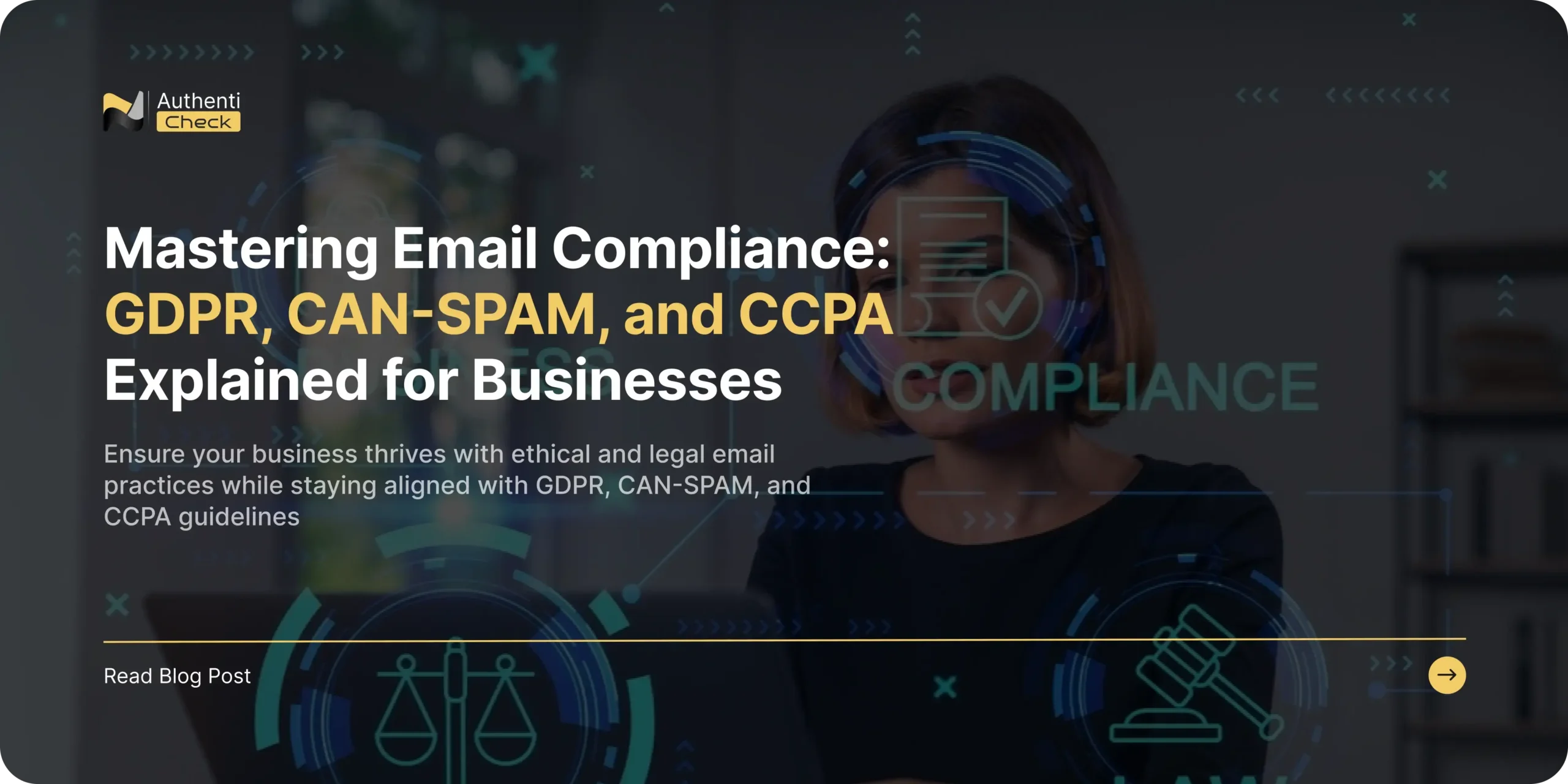
Mastering Email Compliance: GDPR, CAN-SPAM, and CCPA Explained for Businesses
Introduction
In today’s digital-first world, email marketing is more than just a communication channel—it’s an essential tool for building connections, driving growth, and retaining customers. But here’s the catch: navigating privacy laws like GDPR, CAN-SPAM, CASL (Canada’s Anti-Spam Legislation), and CCPA is non-negotiable. Staying compliant helps businesses build trust and avoid hefty fines.
This guide breaks down these key regulations, explains their practical implications, and outlines actionable strategies to keep your email campaigns compliant—whether you’re marketing in the EU, U.S., or Canada.
The Evolving Ecosystem of Privacy Compliance
Why Privacy Laws Matter More Than Ever
Privacy regulations have become increasingly vital due to the following:
- Informed Consumers: Customers now demand control and transparency over their data.
- Advanced Technologies: AI, automation, and data analytics complicate governance.
- Global Standards: Countries are converging on stricter, harmonized frameworks.
- Cybersecurity Risks: Data breaches lead to both financial and reputational damage.
GDPR: Setting the Gold Standard in Data Protection
The General Data Protection Regulation (GDPR), enforced since 2018, protects the privacy rights of EU citizens and applies to any business marketing to or handling EU residents’ data.
Key Principles
- Lawfulness and Transparency: Clear and lawful data collection processes.
- Data Minimization: Only collect data necessary for specific purposes.
- Accountability: Businesses must demonstrate compliance with audits and records.
Consumer Rights at a Glance
| Right | Explanation |
|---|---|
| Access | Individuals can request a copy of their data and understand its usage. |
| Rectification | Errors in personal data must be corrected promptly. |
| Erasure (Right to be Forgotten) | Consumers can request the deletion of their personal data under specific circumstances. |
| Data Portability | Enables users to transfer their data to another provider. |
| Object | Users can opt-out of certain types of processing, including marketing. |
| Automated Decision-Making | Transparency and recourse options are required for algorithm-driven decisions. |

Recent Enhancements
- Granular Consent: Opt-in processes must clearly state data usage.
- Cross-Border Transfers: Following Schrems II, businesses must ensure legal transfer mechanisms like SCCs (Standard Contractual Clauses).
- AI Transparency: Businesses must disclose when decisions are AI-driven and provide options to contest them.
Real-World Example
In 2023, Meta faced a €265 million fine for inadequate data transfer practices. This underscores the importance of robust compliance mechanisms to avoid significant penalties.
CAN-SPAM: Simplifying Email Compliance in the U.S.
The CAN-SPAM Act governs commercial email practices in the U.S., emphasizing transparency, honesty, and user control.
Key Requirements
| Requirement | Details |
|---|---|
| Clear Identification | Emails must disclose themselves as advertisements if applicable. |
| Accurate Subject Lines | Subject lines and headers cannot be misleading. |
| One-Click Unsubscribe | Every email must have an easy unsubscribe option processed within 10 business days. |
| Physical Address | Include a valid, physical postal address in every email. |
Updates:
- AI-generated content in emails must now be disclosed for transparency.
- Penalties can reach up to $46,517 per violation, so compliance is critical.
CASL: Navigating Canada’s Anti-Spam Legislation
Canada’s CASL is among the strictest anti-spam laws globally. It governs all commercial electronic messages (CEMs) sent to Canadian residents, including emails, texts, and social media messages.
Key Compliance Rules
- Express Consent: You need explicit permission before sending a CEM, except in specific cases like existing business relationships.
- Identification: Every email must clearly identify the sender (name, company, and contact details).
- Unsubscribe Mechanism: Provide a clear, functional unsubscribe option processed within 10 days.
- No Misleading Content: Headers, subject lines, and messaging must be honest and accurate.
Recent Trends in CASL
- Transactional Emails: Even transactional or hybrid (e.g., mixed content) emails fall under scrutiny.
- B2B Relationships: Businesses must now document implied or explicit consent, especially for cold outreach.
Practical Example:
A Canadian e-commerce brand implements a double opt-in process to confirm email consent, ensuring compliance while engaging its audience authentically.
CCPA and CPRA: Empowering Consumers in California
The California Consumer Privacy Act (CCPA) and its enhancement, the CPRA, give California residents greater control over their personal data.
Key Consumer Rights
| Right | Explanation |
|---|---|
| Right to Know | Consumers can request details on how their data is collected, shared, or sold. |
| Right to Correct | Businesses must rectify any inaccurate personal data. |
| Opt-Out of Sale | Users can refuse the sale of personal or sensitive data. |
Practical Tip
- Include a “Do Not Sell My Personal Information” link prominently on your website.
- Update privacy policies to outline all data handling processes clearly.
A Comprehensive Compliance Strategy for Global Businesses
- Foster a Privacy-First Culture
- Transparency: Build trust through ethical data practices.
- Competitive Edge: Showcase compliance as a customer-centric advantage.
- Leverage Technology
- Use privacy management tools to automate consent tracking, audits, and risk assessments.
- Invest in encryption and anonymization to protect sensitive data.
- Empower Your Team
- Conduct regular training on GDPR, CASL, CAN-SPAM, and CCPA.
- Assign Privacy Champions to oversee ongoing compliance efforts.
- Monitor and Adapt
- Stay updated with evolving global laws, especially Canada’s CASL and U.S. state-specific regulations.
- Continuously evaluate your systems for compliance gaps.
Conclusion
Email compliance frameworks like GDPR, CAN-SPAM, CASL, and CCPA are not just legal obligations—they’re tools to build trust, transparency, and credibility. By adopting privacy-first practices, leveraging the right technologies, and staying adaptable to new regulations, businesses can navigate the complexities of compliance and gain a competitive edge in today’s privacy-conscious world.
Whether you’re targeting customers in the EU, U.S., or Canada, proactive compliance is key to avoiding fines and fostering long-term relationships with your audience.